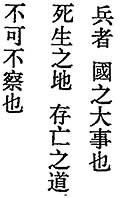 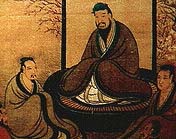 Source [Introduction] [I LAYING PLANS] [II WAGING WAR ] [III ATTACK BY STRATAGEM ] [VI TACTICAL DISPOSITIONS ] [V ENERGY ] [VI WEAK POINTS AND STRONG ] [VII MANEUVERING ] [VIII VARIATION IN TACTICS ] [IX THE ARMY ON THE MARCH ] [X TERRAIN ] [XI THE NINE SITUATIONS ] [XII THE ATTACK BY FIRE ] [XIII THE USE OF SPIES ] [Commentators] [Bibliography] [Footnotes] |
THE OLDEST MILITARY TREATISE IN THE WORLD Translated from the Chinese with Introduction
BY LIONEL GILES, M.A. Assistant in the Department of Oriental Printed Books and MSS.
First Published in 1910 ----------------------------------------------------------------- To my brother
|
-----------------------------------------------------------------
|
The field of life and death; The road to survival or ruin; A subject that must not be ignored. |
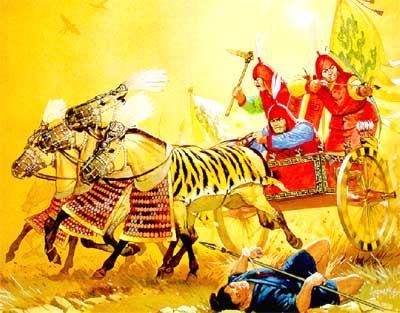 |
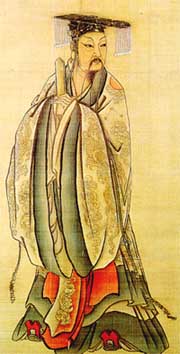 |
|
|
|
If his forces are united, separate them.
The general who loses a battle makes but few calculations beforehand. Thus do many calculations lead to victory, and few calculations to defeat: how much more no calculation at all! It is by attention to this point that I can foresee who is likely to win or lose.
[1] "Words on Wellington," by Sir. W. Fraser.
-----------------------------------------------------------------
with provisions enough to carry them a thousand LI,
the expenditure at home and at the front, including entertainment of guests, small items such as glue and paint, and sums spent on chariots and armor, will reach the total of a thousand ounces of silver per day. Such is the cost of raising an army of 100,000 men.
while government expenses for broken chariots, worn-out horses, breast-plates and helmets, bows and arrows, spears and shields, protective mantles, draught-oxen and heavy wagons, will amount to four-tenths of its total revenue.
-----------------------------------------------------------------
III. ATTACK BY STRATAGEM
the next best is to prevent the junction of the enemy's forces;
and the worst policy of all is to besiege walled cities.
and the piling up of mounds over against the walls will take three months more.
with the result that one-third of his men are slain, while the town still remains untaken. Such are the disastrous effects of a siege.
This is the method of attacking by stratagem.
if twice as numerous, to divide our army into two.
if slightly inferior in numbers, we can avoid the enemy;
if quite unequal in every way, we can flee from him.
through ignorance of the military principle of adaptation to circumstances. This shakes the confidence of the soldiers.
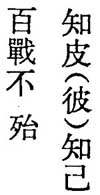 18. Hence the saying: If you know the enemy and know yourself, you need not fear the result of a hundred battles. If
you know yourself but not the enemy, for every victory gained you will also suffer a defeat.
18. Hence the saying: If you know the enemy and know yourself, you need not fear the result of a hundred battles. If
you know yourself but not the enemy, for every victory gained you will also suffer a defeat.If you know neither the enemy nor yourself, you will succumb in every battle.
-----------------------------------------------------------------
but cannot make certain of defeating the enemy.
he who is skilled in attack flashes forth from the topmost heights of heaven.
Thus on the one hand we have ability to protect ourselves; on the other, a victory that is complete.
to see the sun and moon is no sign of sharp sight; to hear the noise of thunder is no sign of a quick ear.
Making no mistakes is what establishes the certainty of victory, for it means conquering an enemy that is already defeated.
-----------------------------------------------------------------
Energy may be likened to the bending of a crossbow;
|
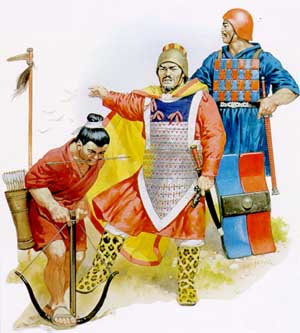 |
concealing courage under a show of timidity presupposes a fund of latent energy;
masking strength with weakness is to be effected by tactical dispositions.
He sacrifices something, that the enemy may snatch at it.
Hence his ability to pick out the right men and utilize combined energy.
[1] "Forty-one Years in India," chapter 46.
-----------------------------------------------------------------
if well supplied with food, he can starve him out; if quietly encamped, he can force him to move.
You can ensure the safety of your defense if you only hold positions that cannot be attacked.
and hence we can hold the enemy's fate in our hands.
and his forces being thus distributed in many directions, the numbers we shall have to face at any given point will be proportionately few.
Force him to reveal himself, so as to find out his vulnerable spots.
conceal your dispositions, and you will be safe from the prying of the subtlest spies, from the machinations of the wisest brains.
the four seasons make way for each other in turn.
There are short days and long; the moon has its periods of waning and waxing.
[1] See Col. Henderson's biography of Stonewall Jackson, 1902 ed., vol. II, p. 490.
-----------------------------------------------------------------
The difficulty of tactical maneuvering consists in turning the devious into the direct, and misfortune into gain.
doing a hundred LI in order to wrest an advantage, the leaders of all your three divisions will fall into the hands of the enemy.
your compactness that of the forest.
is immovability like a mountain.
when you capture new territory, cut it up into allotments for the benefit of the soldiery.
Such is the art of maneuvering.
On the field of battle,
the spoken word does not carry far enough: hence the institution of gongs and drums. Nor can ordinary objects be seen clearly enough: hence the institution of banners and flags.
This is the art of handling large masses of men.
a commander-in-chief may be robbed of his presence of mind.
by noonday it has begun to flag; and in the evening, his mind is bent only on returning to camp.
Do not interfere with an army that is returning home.
Do not press a desperate foe too hard.
[1] See Col. Henderson, op. cit. vol. I. p. 426.
[2] For a number of maxims on this head, see "Marshal Turenne" (Longmans, 1907), p. 29.
-----------------------------------------------------------------
In hemmed-in situations, you must resort to stratagem. In desperate position, you must fight.
armies which must be not attacked,
towns which must be besieged,
positions which must not be contested, commands of the sovereign which must not be obeyed.
and make trouble for them,
and keep them constantly engaged;
hold out specious allurements, and make them rush to any given point.
[1] "Marshal Turenne," p. 50.
-----------------------------------------------------------------
facing the sun.
Do not climb heights in order to fight. So much for mountain warfare.
Do not move up-stream to meet the enemy.
So much for river warfare.
So much for operations in salt-marches.
so that the danger may be in front, and safety lie behind. So much for campaigning in flat country.
which enabled the Yellow Emperor to vanquish four several sovereigns.
and sunny places to dark.
and camp on hard ground, the army will be free from disease of every kind,
and this will spell victory.
confined places,
tangled thickets,
quagmires
and crevasses,
should be left with all possible speed and not approached.
The appearance of a number of screens in the midst of thick grass means that the enemy wants to make us suspicious.
Startled beasts indicate that a sudden attack is coming.
When it branches out in different directions, it shows that parties have been sent to collect firewood. A few clouds of dust moving to and fro signify that the army is encamping.
Violent language and driving forward as if to the attack are signs that he will retreat.
and the soldiers fall into rank, it means that the critical moment has come.
Clamor by night betokens nervousness.
and when the men do not hang their cooking-pots over the camp-fires, showing that they will not return to their tents, you may know that they are determined to fight to the death.
too many punishments betray a condition of dire distress.
What we can do is simply to concentrate all our available strength, keep a close watch on the enemy, and obtain reinforcements.
This is a certain road to victory.
the gain will be mutual.
[1] "Aids to Scouting," p. 26.
-----------------------------------------------------------------
(2) entangling ground;
(3) temporizing ground;
(4) narrow passes; (5) precipitous heights; (6) positions at a great distance from the enemy.
Then you will be able to fight with advantage.
it will be advisable not to stir forth, but rather to retreat, thus enticing the enemy in his turn; then, when part of his army has come out, we may deliver our attack with advantage.
and fighting will be to your disadvantage.
The general who has attained a responsible post must be careful to study them.
When the officers are too strong and the common soldiers too weak, the result is COLLAPSE.
when there are no fixes duties assigned to officers and men,
and the ranks are formed in a slovenly haphazard manner, the result is utter DISORGANIZATION.
but a power of estimating the adversary, of controlling the forces of victory, and of shrewdly calculating difficulties, dangers and distances, constitutes the test of a great general.
whose only thought is to protect his country and do good service for his sovereign, is the jewel of the kingdom.
